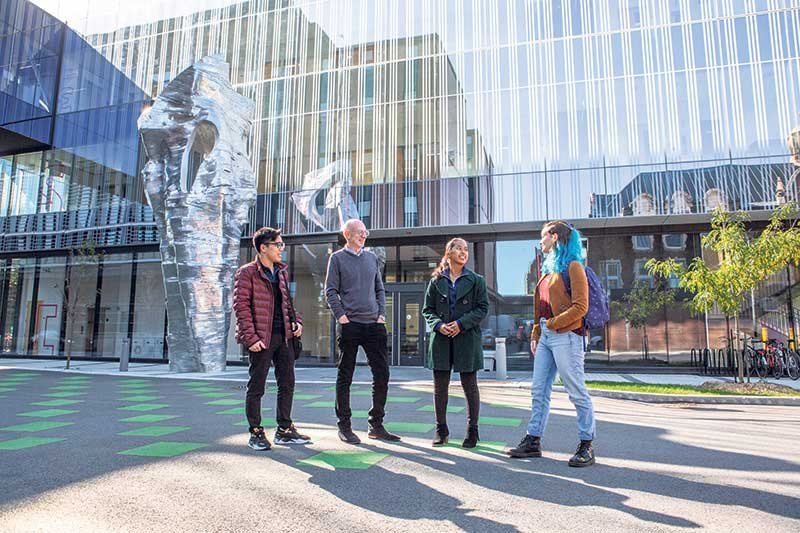Concordia cements its position as Canada’s next-gen university
Concordia president Graham Carr with a group of students outside the university's Science Hub. Concordia University
In an era of unprecedented change ranging from disruptive new technologies to the drive for sustainability, universities are facing the growing challenge of how to prepare students for success in a rapidly transforming world.
For Montreal’s Concordia University, it means determining what that success looks like and identifying the strategies to achieve it in an initiative aimed at cementing the institution’s position as Canada’s next-generation university.
To support the transformation, the university has launched the Campaign for Concordia. Next-Gen. Now, its most ambitious fundraising initiative ever. The campaign is on track to raise more than $300-million to coincide with the university’s 50th anniversary in 2024-25.
Graham Carr, Concordia’s president, says a next-gen university is a vibrant and innovative institution that can adapt during an era of disruption to respond to the grand challenges society faces, offer its students exciting experiential learning opportunities and responsibly steward the donations that are enabling the campaign’s ambitious objectives.
Prof. Carr says Concordia is building on its existing strengths including the accomplishments of its Centre for Cybersecurity, the largest university-based cybersecurity lab in Canada; its renowned Faculty of Fine Arts; and the Institute for the Urban and Built Environment where cross-disciplinary collaboration is reimagining urban living.
“Philanthropy allows us to dream bigger and accomplish more by helping us support students in the form of academic scholarships and fellowships and initiate innovative research programs. It can be a real difference-maker in taking public education in Canada beyond the good place where it exists today, to something far more ambitious,” he says.
The difference a scholarship can make is evident in the life journey of Concordia alumna Gina Cody, who established a successful career and leadership role in the engineering sector and was one of the early donors to the Campaign for Concordia.
The university recognized her $15-million donation and her achievements in the engineering sector by renaming its engineering and computer science faculty the Gina Cody School of Engineering and Computer Science.
Ms. Cody is now a co-chair of the campaign with business leaders and philanthropists Andrew Molson and Lino Saputo Jr.
“I came to Canada from Iran during the revolution with only $2,000 in my pocket and [Concordia] provided me with a scholarship. That moment of kindness and giving to a young woman changed my life and set me up for success,” says Ms. Cody. “When I became successful, I wanted to get back to my roots and create a platform for those who are coming after me. The naming [of the faculty] is not about me, it’s about it being named for a woman. When I see the young women who enter the university, they speak about it. They say now they feel they belong, that they are accepted – that's the thing that is really near and dear to my heart.”
Ms. Cody believes there are three chapters in life.
“The first, being cherished by your parents, teachers, professors and everybody else, then the second chapter – I call it the ‘me chapter’ – it's all about ourselves and making a life, our business, our children. And then the third chapter is the giving back chapter to complete the circle, because I wouldn't be where I am if many people before me had not paved the road for me and paid it forward,” she says.
“I came to Canada from Iran during the revolution with only $2,000 in my pocket and [Concordia] provided me with a scholarship. That moment of kindness and giving to a young woman changed my life and set me up for success. ”
Ms. Cody notes that half of Canada’s population is made up of women and Canadian society is a mix of cultures. She says the values of equity, diversity and inclusion are not just ethically right, they are a proven smart business practice, and she wants to encourage more successful women to give to institutions like Concordia.
Concordia vice-president of advancement Paul Chesser says approximately two-thirds of the funds raised so far for the campaign are from individuals – the university’s alumni, their friends, families and other supporters – while one-third is from corporate donations and large philanthropic foundations.
As a relatively young university, Concordia continues to build a base of support, Mr. Chesser says.
“The university is coming into its own, and the opportunity to support the campaign can blaze a new trail and start a tradition of giving for future generations,” he says.
With a healthy cohort of international students, the campaign is also engaging graduates who are leaders in places such as Silicon Valley, Hollywood and financial capitals like New York, London and Toronto, says Mr. Chesser, pointing to the decades-old alumni association in Hong Kong as an example.
“We’ve got leaders in every facet of society around the world, and through the Campaign for Concordia we want to reconnect and engage with all of them,” he says.
For more information, visit concordia.ca/campaign
To view this report on The Globe's website, visit globeandmail.com
To view the full report as it appeared in The Globe's print edition: Season of Giving


